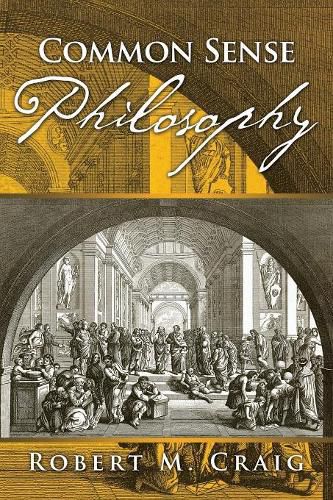Readings Newsletter
Become a Readings Member to make your shopping experience even easier.
Sign in or sign up for free!
You’re not far away from qualifying for FREE standard shipping within Australia
You’ve qualified for FREE standard shipping within Australia
The cart is loading…






This title is printed to order. This book may have been self-published. If so, we cannot guarantee the quality of the content. In the main most books will have gone through the editing process however some may not. We therefore suggest that you be aware of this before ordering this book. If in doubt check either the author or publisher’s details as we are unable to accept any returns unless they are faulty. Please contact us if you have any questions.
Common-Sense Philosophy uses our natural reasoning capacity that makes judgements about statements or propositions. Reasoning is a starting point, as it is impossible to prove reason using our reason. our common-sense notions are a feature of our nature. Our common-sense oes not challenge whether we can think; rather it uses our thinking in exploring important questions.
e current volume explores the four most important philosophical issues: What is our nature? How do we think and reason? How ought we live, including moral questions? How do these issues relate to society at large, the political realm?
Common-sense philosophy has been elaborated throughout human written history. Socrates used human examples to explore concepts of justice. Jesus’ parables achieved similar e ects. e Greco-Roman stoics, Epictetus and Marcus Aurelius, used common-place examples in their eaching. omas Reid of the Scottish enlightenment discussed the accession of knowledge by how our sense organs work. The great 20th century Christian philosopher, C. S. Lewis, lectured in common-sense language. William James and the utilitarians; and the more modern analytical philosophers employed similar techniques in their writing.
$9.00 standard shipping within Australia
FREE standard shipping within Australia for orders over $100.00
Express & International shipping calculated at checkout
This title is printed to order. This book may have been self-published. If so, we cannot guarantee the quality of the content. In the main most books will have gone through the editing process however some may not. We therefore suggest that you be aware of this before ordering this book. If in doubt check either the author or publisher’s details as we are unable to accept any returns unless they are faulty. Please contact us if you have any questions.
Common-Sense Philosophy uses our natural reasoning capacity that makes judgements about statements or propositions. Reasoning is a starting point, as it is impossible to prove reason using our reason. our common-sense notions are a feature of our nature. Our common-sense oes not challenge whether we can think; rather it uses our thinking in exploring important questions.
e current volume explores the four most important philosophical issues: What is our nature? How do we think and reason? How ought we live, including moral questions? How do these issues relate to society at large, the political realm?
Common-sense philosophy has been elaborated throughout human written history. Socrates used human examples to explore concepts of justice. Jesus’ parables achieved similar e ects. e Greco-Roman stoics, Epictetus and Marcus Aurelius, used common-place examples in their eaching. omas Reid of the Scottish enlightenment discussed the accession of knowledge by how our sense organs work. The great 20th century Christian philosopher, C. S. Lewis, lectured in common-sense language. William James and the utilitarians; and the more modern analytical philosophers employed similar techniques in their writing.